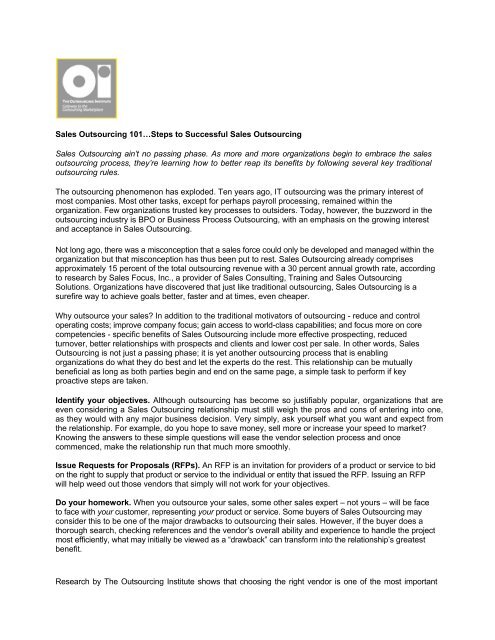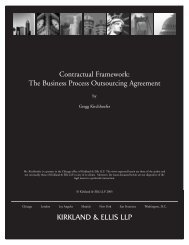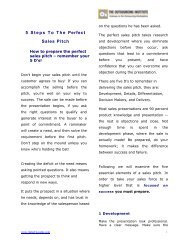Sales Outsourcing 101… - The Outsourcing Institute
Sales Outsourcing 101… - The Outsourcing Institute
Sales Outsourcing 101… - The Outsourcing Institute
Create successful ePaper yourself
Turn your PDF publications into a flip-book with our unique Google optimized e-Paper software.
<strong>Sales</strong> <strong>Outsourcing</strong> <strong>101…</strong>Steps to Successful <strong>Sales</strong> <strong>Outsourcing</strong><br />
<strong>Sales</strong> <strong>Outsourcing</strong> ain’t no passing phase. As more and more organizations begin to embrace the sales<br />
outsourcing process, they’re learning how to better reap its benefits by following several key traditional<br />
outsourcing rules.<br />
<strong>The</strong> outsourcing phenomenon has exploded. Ten years ago, IT outsourcing was the primary interest of<br />
most companies. Most other tasks, except for perhaps payroll processing, remained within the<br />
organization. Few organizations trusted key processes to outsiders. Today, however, the buzzword in the<br />
outsourcing industry is BPO or Business Process <strong>Outsourcing</strong>, with an emphasis on the growing interest<br />
and acceptance in <strong>Sales</strong> <strong>Outsourcing</strong>.<br />
Not long ago, there was a misconception that a sales force could only be developed and managed within the<br />
organization but that misconception has thus been put to rest. <strong>Sales</strong> <strong>Outsourcing</strong> already comprises<br />
approximately 15 percent of the total outsourcing revenue with a 30 percent annual growth rate, according<br />
to research by <strong>Sales</strong> Focus, Inc., a provider of <strong>Sales</strong> Consulting, Training and <strong>Sales</strong> <strong>Outsourcing</strong><br />
Solutions. Organizations have discovered that just like traditional outsourcing, <strong>Sales</strong> <strong>Outsourcing</strong> is a<br />
surefire way to achieve goals better, faster and at times, even cheaper.<br />
Why outsource your sales? In addition to the traditional motivators of outsourcing - reduce and control<br />
operating costs; improve company focus; gain access to world-class capabilities; and focus more on core<br />
competencies - specific benefits of <strong>Sales</strong> <strong>Outsourcing</strong> include more effective prospecting, reduced<br />
turnover, better relationships with prospects and clients and lower cost per sale. In other words, <strong>Sales</strong><br />
<strong>Outsourcing</strong> is not just a passing phase; it is yet another outsourcing process that is enabling<br />
organizations do what they do best and let the experts do the rest. This relationship can be mutually<br />
beneficial as long as both parties begin and end on the same page, a simple task to perform if key<br />
proactive steps are taken.<br />
Identify your objectives. Although outsourcing has become so justifiably popular, organizations that are<br />
even considering a <strong>Sales</strong> <strong>Outsourcing</strong> relationship must still weigh the pros and cons of entering into one,<br />
as they would with any major business decision. Very simply, ask yourself what you want and expect from<br />
the relationship. For example, do you hope to save money, sell more or increase your speed to market?<br />
Knowing the answers to these simple questions will ease the vendor selection process and once<br />
commenced, make the relationship run that much more smoothly.<br />
Issue Requests for Proposals (RFPs). An RFP is an invitation for providers of a product or service to bid<br />
on the right to supply that product or service to the individual or entity that issued the RFP. Issuing an RFP<br />
will help weed out those vendors that simply will not work for your objectives.<br />
Do your homework. When you outsource your sales, some other sales expert – not yours – will be face<br />
to face with your customer, representing your product or service. Some buyers of <strong>Sales</strong> <strong>Outsourcing</strong> may<br />
consider this to be one of the major drawbacks to outsourcing their sales. However, if the buyer does a<br />
thorough search, checking references and the vendor’s overall ability and experience to handle the project<br />
most efficiently, what may initially be viewed as a “drawback” can transform into the relationship’s greatest<br />
benefit.<br />
Research by <strong>The</strong> <strong>Outsourcing</strong> <strong>Institute</strong> shows that choosing the right vendor is one of the most important
factors for successful outsourcing. According to industry consultant Alan Deichler, some red flags to look<br />
out for include the following:<br />
•<br />
•<br />
•<br />
<strong>The</strong> vendor has never performed your objective.<br />
<strong>The</strong> vendor does not have a large enough staff to handle the project.<br />
<strong>The</strong> vendor is unable to provide enough sales “expertise.”<br />
If the vendor does not have enough expertise but is willing to hire those who are experts in your industry,<br />
then that may be fine, says Deichler. But be wary of the “Jack of all Trades” who is limited in resources, as<br />
well as experience, he warns. <strong>The</strong>n you are probably dealing with a small company, and “that may be a<br />
risk.”<br />
Create a contract for services you want rather than for what the supplier would like to provide. Take<br />
account of matters like volume, performance, cost, failure and exit. <strong>The</strong> contract should be as detailed as<br />
possible and allow for the constant refining or modification of goals, regardless of their size. Make sure the<br />
provider understands what kind of people they need to hire and put in writing that if you are not satisfied<br />
with their recruits, they will be replaced at no penalty to your organization. Bringing an attorney on board<br />
who specializes in outsourcing contracts, specifically, can help to create and maintain a healthy contract<br />
and outsourcing relationship.<br />
Establish measurable goals. After you identify your expectations, it is best to put a number to it, says<br />
Deichler. How many weeks should it take to sell x amount of your product? Setting goals and a means to<br />
measure them will help you to see where you are throughout the contract.<br />
Implement a reporting system. Once the contract is up and running, there should be regular reporting<br />
taking place every week. Paper, telephone, electronically – whatever – but it must be done. Furthermore,<br />
keeping good, clear records will allow you to see how the relationship has progressed from start to finish,<br />
not to mention, serve as proof of error should there be issues with the provider’s performance.<br />
Educate the outsourcing staff. <strong>The</strong> outsourcing staff needs to understand your product or service so they<br />
can best promote it and convey to your customers how it will meet their needs. According to Deichler, “It is<br />
worth investing some extra time and dollars in a kickoff training session,” which will bring all the players<br />
together before fresh faces arrive on your customer’s door. “Kick it off the same way you would a beginningof-the-year<br />
sales event; this way the new players can be trained on your product or service and the old ones<br />
can become better acquainted and comfortable with the new arrangement,” Deichler suggests. This will<br />
result in an overall camaraderie between both parties and ultimately a much higher level of success through<br />
the contract’s duration.<br />
Consider a shared risk. A recent IDC study, sponsored by Accenture, determined that executives are<br />
demanding more of outsourcing service providers, focusing on contractual commitments to achieve business<br />
outcomes. <strong>The</strong>re is an increasing desire for the outsourcing provider to become a business partner by<br />
sharing the risks and rewards associated with an arrangement. According to the study, 64 percent of<br />
executives noted that they consider an outsourcing provider's willingness to share risk when making the<br />
decision to select a partner.<br />
In a <strong>Sales</strong> <strong>Outsourcing</strong> agreement, risks and rewards can both be shared. For example, the buyer may<br />
provide a base salary initially, but bonuses and commission will only be offered after a completed sale.<br />
Maintain an open line of communication. This is not the same as “reporting.” In a <strong>Sales</strong> <strong>Outsourcing</strong><br />
arrangement, it is not that simple to just drop in and see how the outsourced staff are performing. Designate<br />
an individual or individuals who you can rely upon for feedback beyond special reports, someone who is<br />
either accessible via telephone or email, for example. In return, you or another qualified party in your<br />
organization should be just as accessible to the outsourced staff. As in all outsourcing agreements, an open<br />
line of communication should allow both parties to feel comfortable addressing any comments or concerns<br />
at any time throughout the relationship.<br />
Make the Commitment. “<strong>Outsourcing</strong> is similar to a marriage,” says Frank Casale, president and founder
of <strong>The</strong> <strong>Outsourcing</strong> <strong>Institute</strong>. You will forever hear this analogy used by experts when they describe<br />
outsourcing<br />
relationships. Hard work and careful attention to detail are critical in making the relationship a<br />
success. <strong>Sales</strong> <strong>Outsourcing</strong>, especially, takes true teamwork, communication and trust.




